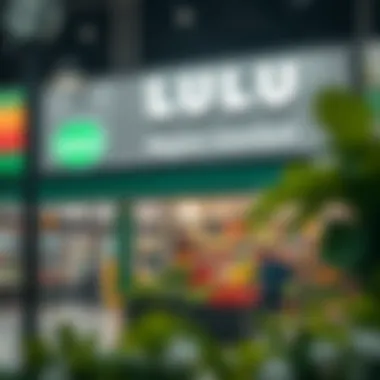Lulu Hypermarket's Role in the Green Community


Intro
In the heart of the Green Community lies Lulu Hypermarket, a significant player that not only serves the everyday needs of the local residents but also contributes towards fostering sustainability and economic growth. This analysis highlights the hypermarket's integral role in promoting sustainable living while bolstering community bonding. The Green Community, celebrated for its eco-friendly initiatives, provides the ideal backdrop for Lulu to flourish as both a retailer and a responsible corporate citizen.
Understanding the dynamics of Lulu Hypermarket requires examining how it aligns with market trends and community aspirations. This discussion will illuminate its impact on local shopping habits, the investment potential the area presents, and how Lulu engages with both its customers and the environment. Ultimately, this overview aims to give readers—whether they be investors, homebuyers, or community members—a nuanced perspective on the opportunities and challenges present in this unique setting.
Preamble to Lulu Hypermarket
In the ever-evolving landscape of retail, the emergence of hypermarkets like Lulu has fundamentally reshaped the shopping experience. Understanding Lulu Hypermarket is crucial, not only because of its expansive product offerings but also due to its significance within the Green Community context. A key element to explore is how this retail giant contributes to both local economic health and environmental sustainability, acting as a fulcrum of community interaction.
Overview of Lulu Hypermarket
Lulu Hypermarket prides itself on a wide array of products, serving as a one-stop-shop for residents and visitors alike. From fresh produce to electronics, the hypermarket encapsulates the modern shopping experience, catering to diverse consumer needs. What sets it apart is its staunch commitment to quality and value, ensuring shoppers leave with goods that are not only affordable but also reliable. Additionally, Lulu places great emphasis on customer service, creating a welcoming environment where patrons feel valued.
The hypermarket also embraces technology to enhance the shopping experience. With their mobile application, customers can quickly access promotions, create shopping lists, or even enjoy home delivery services, making life easier in today’s fast-paced world. This adaptability aligns seamlessly with consumer demands, particularly as more people seek convenience in their purchasing activities.
History and Growth
Lulu Hypermarket's journey began in the early 2000s, with the ultimate goal of revolutionizing retail in the Middle East. It was initially a modest venture, emerging from the vision of its founders to provide quality goods at competitive prices. Over the years, the brand has blossomed tremendously, expanding its footprint not just in the UAE but in various international markets.
The growth trajectory of Lulu is marked by its aggressive expansion strategies, evidenced by the rapid establishment of new outlets. Each new store contributes to job creation, local economies, and the preservation of cultural values within their communities. This relentless pursuit of growth, however, is coupled with a dedication to sustainability. For instance, initiatives such as sourcing local produce align with their mission to minimize carbon footprint while supporting local farmers.
As it stands today, the hypermarket is a household name. They've fostered a strong brand loyalty among consumers who appreciate their ability to blend quality, variety, and convenience. The story of Lulu Hypermarket is one that not only highlights business acumen but also emphasizes responsibility towards the community and environment.
The Green Community: A Sustainable Living Concept
The concept of a Green Community has gained substantial traction in recent years as the world grapples with climate change and the pursuit of sustainable living. Lulu Hypermarket's integration into the Green Community is not just a retail development; it symbolizes a shift towards eco-conscious consumerism and community involvement. By understanding what defines a Green Community and how Lulu contributes to this concept through sustainability initiatives, homebuyers and investors can appreciate the broader implications of their choices.
Defining the Green Community
At its core, the Green Community embodies principles of sustainability, eco-friendliness, and conscious living. It's a neighborhood designed with the environment in mind. Developers prioritize the use of renewable energy sources, water conservation technologies, and green spaces that enhance the quality of life while lessening the ecological footprint.
The layout often includes pedestrian-friendly pathways, bike lanes, and public transport to encourage less reliance on vehicles. This holistic approach fosters community interaction, allowing residents to connect over shared goals of sustainability and wellness.
What makes the Green Community unique is not just its physical layout but the mindset of its inhabitants. Residents are often involved in community gardens or local initiatives that promote recycling, reducing waste, and being conscientious about consumption. Through these collaborative efforts, the Green Community seeks to enhance biodiversity and encourage greener practices in everyday life.
Sustainability Initiatives
Lulu Hypermarket has embraced its role as a key player in fostering a sustainable environment. The hypermarket implements various initiatives that align with the tenets of the Green Community, setting a strong precedent for other businesses.
Key initiatives include:
- Waste Management Strategies: Lulu focuses on recycling and composting. By introducing designated bins for different types of waste, shoppers can actively participate in reducing landfill contributions. This practice not only lessens the environmental impact but also educates customers about responsible waste disposal.
- Energy Efficiency Measures: The store employs energy-efficient lighting, such as LEDs, and embraces technologies that reduce overall energy consumption. By optimizing refrigeration systems and integrating smart technology, Lulu minimizes its carbon footprint, thereby enhancing its waste management efficiency.
- Local Sourcing: Aligning with the principles of sustainability, Lulu chooses to source products from local suppliers whenever possible. This not only supports the local economy but reduces transportation emissions, which is a key factor in overall sustainability.
- Community Engagement: Lulu Hypermarket actively participates in local events, offering workshops and educational programmes that focus on sustainable practices. These initiatives allow consumers to learn about organic farming, sustainable nutrition, and other eco-friendly living strategies.


By implementing these measures, Lulu Hypermarket not only enhances its operational efficiency but also nurtures a culture of sustainability within the Green Community. This approach directly benefits customers, who are increasingly seeking businesses that reflect their values regarding environmental stewardship and community welfare.
Economic Impact of Lulu Hypermarket
The impact of Lulu Hypermarket on the local economy within the Green Community is noteworthy and multifaceted. Understanding this impact allows for a deeper grasp of how such a retail giant functions as a catalyst for economic growth, social welfare, and sustainable practices. The hypermarket not only provides essential goods but also contributes significantly to local development, employment, and supplier relationships. This section delves into two crucial aspects: local job creation and support for local suppliers, providing a comprehensive overview of Lulu Hypermarket's economic footprint.
Local Job Creation
One of the most immediate economic benefits of Lulu Hypermarket in the Green Community is job creation. The hypermarket not only employs hundreds of locals but also creates a variety of job opportunities that cater to different skill levels. From entry-level positions to management roles, the array of jobs offered directly impacts the livelihoods of many families.
- Direct Employment: The hypermarket hires a substantial number of staff, contributing to decreased unemployment rates in the area. Positions range from cashiers and stock clerks to human resource managers. This diverse job pool means many residents find suitable employment right in their neighborhood, making work accessible.
- Indirect Job Creation: Beyond direct employment, Lulu Hypermarket stimulates further job opportunities in ancillary businesses. For instance, increased foot traffic leads to a rise in demand for local services such as cleaning, maintenance, and security. Local transportation services also benefit, as customers might seek rides to the hypermarket, especially in a community where public transport may lag.
- Skills Development: This hypermarket also invests in staff training programs. Employees gain not just technical skills but also customer service experience that can be valuable throughout their careers. This is particularly significant in a growing community like Green Community, where retail skills can be a stepping stone to better opportunities.
Overall, the local job creation that Lulu Hypermarket stimulates plays a significant role in fostering a vibrant and economically resilient community.
Support for Local Suppliers
Lulu Hypermarket's influence extends to its support for local suppliers, establishing a robust link between community agriculture and productive retail endeavors. This partnership is vital to the sustainability of local businesses and the economy overall.
- Sourcing Local Produce: The hypermarket is known for prioritizing local suppliers, especially for fresh produce. This results in a reduced carbon footprint, as goods do not have to be transported over long distances. Buying local supports farmers who often face challenges competing with mass-produced goods from larger suppliers.
- Economic Multiplier Effect: When Lulu Hypermarket purchases from local suppliers, it not only enhances their income but also creates a ripple effect in the local economy. These suppliers, in turn, reinvest their earnings in the community, further cultivating economic resilience. For example, farmers may employ additional labor or purchase supplies locally, enhancing the economic landscape further.
- Quality of Goods: The hypermarket ensures that the quality of locally sourced products meets its standards, which also helps elevate the reputation of local businesses. Consumers, recognizing the quality of locally sourced goods available at Lulu, may become more mindful of supporting their local economy through their purchases.
Lulu Hypermarket's commitment to local suppliers doesn't just aid in immediate economic benefits; it strengthens the community's socio-economic fabric, promoting sustainability and mutual growth.
"By fostering local partnerships, Lulu Hypermarket is not just a retail space but a hub for community growth and resilience."
The economic anchor it provides benefits all stakeholders, reinforcing the importance of a hypermarket committed to community development.
Consumer Behavior and Preferences
Understanding consumer behavior and preferences is essential when examining Lulu Hypermarket's impact in the Green Community. As a central hub for shopping, Lulu's influence stretches beyond mere transactions; it shapes how local residents engage with retail and, by extension, sustainable practices. Analyzing this aspect offers invaluable insights into the shopping tendencies, motivations, and desires of a community that values eco-friendliness.
Shopping Patterns in the Green Community
In the Green Community, shopping habits often reflect the environmental values held by its residents. Eco-conscious choices are becoming increasingly prominent, influencing consumers to favor products that are sustainably sourced or packaged. Here's what we commonly observe:
- Local Sourcing: Many shoppers prefer to buy from local suppliers, which not only supports the community but also reduces the carbon footprint associated with transportation.
- Organic and Healthy Options: There is a marked preference for organic fruits, vegetables, and other consumables. In this demographic, food is not just sustenance; it's a lifestyle choice that aligns with health-conscious living.
- Online Shopping: Interestingly, a growing number of consumers are utilizing online platforms for their purchases. The convenience of home delivery resonates well with the busy lifestyles of many residents, although they remain conscious of the environmental implications of packaging and delivery logistics.
"In the age of sustainability, consumers make choices that reflect their values, often at the checkout counter."
Expectations of Local Customers
Local customers have certain expectations from Lulu Hypermarket that go beyond quality products. They anticipate a seamless shopping experience that marries convenience with responsible practices. Some key expectations include:
- Transparency: Customers demand clear information regarding product sourcing and sustainability. This includes knowing whether goods are locally produced or if they comply with environmental standards.
- Affordability: Although sustainability is paramount, price remains a significant factor. Shoppers seek reasonably-priced organic and eco-friendly items, reflecting a balance between budget and values.
- Community Engagement: Residents expect Lulu Hypermarket to play an active role in community initiatives, whether by hosting local events or supporting charitable causes.
- Diverse Offerings: The desire for a range of products—from everyday groceries to specialty items that cater to various dietary needs—reflects the growing diversity of lifestyles within the Green Community.
In summary, understanding the nuanced behaviors and expectations of consumers in the Green Community enrich the narrative of how Lulu Hypermarket not only serves curent needs but also aligns with the overarching values of sustainability and community integration.


Sustainable Practices at Lulu Hypermarket
Sustainable practices form the backbone of Lulu Hypermarket's operational philosophy, weaving seamlessly into its integration within the Green Community. By focusing on sustainable measures, Lulu not only enhances its corporate image but also significantly contributes to the welfare of the environment and local economy. The emphasis on eco-friendly practices reflects a commitment to responsible retailing, aligning with both consumer expectations and environmental needs.
Waste Management Strategies
Waste management at Lulu Hypermarket manifests through a multi-faceted approach that prioritizes reduction, reuse, and recycling. Recognizing the increasing concerns about waste accumulation, the hypermarket employs several essential strategies:
- Source Reduction: Organizing inventory to minimize excess and spoilage is crucial. By optimizing stock levels, Lulu ensures that fewer items go to waste.
- Recycling Programs: Collaborating with local agencies, Lulu implements comprehensive recycling initiatives, encouraging customers to recycle packaging and promoting eco-friendly alternatives. Notably, the hypermarket also recycles waste generated from its operations, such as cardboard and plastics, diverting them from landfills.
- Composting Efforts: Organic waste management includes composting food scraps and expired goods, which are transformed into nutrient-rich soil for local community gardens.
"Waste management is not merely a necessity; it's a responsibility that businesses must embrace for a sustainable future."
Furthermore, Lulu runs educational campaigns for customers, informing them of how they can participate in these programs and highlighting the environmental significance. This collaboration fosters community awareness and encourages a culture of sustainability.
Energy Efficiency Measures
Energy efficiency emerges as another cornerstone of sustainable practices at Lulu Hypermarket. Given the energy-intensive nature of retail operations, Lulu adopts various measures to minimize its carbon footprint. Key initiatives include:
- LED Lighting: Replacing traditional lighting with energy-efficient LEDs across the hypermarket not only decreases energy consumption but also reduces running costs. This switch reflects a long-term commitment toward greener alternatives.
- Smart Energy Management Systems: Implementing technologies that monitor energy usage in real-time allows for strategic adjustments that optimize consumption during peak hours.
- Sustainable Building Practices: Lulu Hypermarket’s design incorporates architectural elements that enhance natural lighting and ventilation, reducing reliance on artificial heating and cooling systems.
The outcomes are tangible: energy bills decrease, and the negative impact on the environment is mitigated. This commitment to energy efficiency not only aligns with Lulu's corporate ethos but also resonates with environmentally conscious customers in the Green Community, solidifying its place as a leader in sustainable retailing.
With these sustainable practices firmly in place, Lulu Hypermarket continues to set a standard for responsible business operations, thereby reinforcing its role as a vital component of the Green Community.
Community Engagement Initiatives
Community engagement initiatives are critical in enhancing the synergy between Lulu Hypermarket and the Green Community. They serve as a bridge that connects the hypermarket with local residents, fostering trust and collaboration while promoting social responsibility. The importance of these initiatives cannot be understated. They not only help in building a strong community but also improve the overall perception of the brand within the local context.
Incorporating community-focused strategies allows Lulu Hypermarket to address specific needs and concerns of residents. For instance, engaging with the community through various programs can lead to the identification of local challenges that require attention, such as food insecurity or environmental sustainability. The process encourages local input, making residents feel valued and enhancing loyalty to the hypermarket.
Corporate Social Responsibility Programs
Lulu Hypermarket's commitment to corporate social responsibility (CSR) is evident in its numerous programs designed to uplift the local community. These CSR initiatives often include educational programs, health awareness campaigns, and environmental conservation efforts. For instance, Lulu has previously organized events that educate families on the importance of nutrition and sustainable living practices. By focusing on health and well-being, Lulu not only promotes its own products but also positively impacts community health levels.
Furthermore, through charitable donations and partnerships with non-profits, Lulu Hypermarket contributes significantly to local welfare. This fosters a sense of belonging and support within the community. According to reports, for every dollar invested in these initiatives, there's a tangible return in community goodwill, which reflects positively on Lulu's brand reputation.
Partnerships with Local Organizations
Establishing partnerships with local organizations stands as a pillar of community engagement for Lulu Hypermarket. These collaborations enhance the effectiveness of community initiatives by pooling resources and expertise. For example, by partnering with educational institutions, Lulu can support local schools through sponsorship of events or donation of supplies. This collaboration not only aids students but also aligns Lulu’s brand with positive community values.
Local NGOs often provide critical insights into the challenges faced by residents. By working together with these organizations, Lulu can address issues more effectively. This might involve co-hosting events focused on environmental awareness, like tree-planting drives or recycling programs. Such initiatives not only help the environment but also encourage community participation, strengthening community bonds.
Engaging with the community through targeted partnerships shows that Lulu Hypermarket is not just a business; it’s a committed stakeholder in the well-being of the community. This fosters a sense of responsibility among residents, ensuring that everyone plays a part in sustaining their environment.
"A company that builds its brand on community values inherently fosters loyalty and trust among consumers."


Challenges Faced by Lulu Hypermarket
Competition in the Retail Sector
As the retail landscape continues to evolve, it’s critical to grasp the hurdles Lulu Hypermarket encounters in a competitive environment. The hypermarket competes against various retail formats, including online platforms, local grocery stores, and larger supermarket chains—all vying for the same customers. This fierce competition not only influences pricing strategies but also compels Lulu to differentiate itself through unique offerings and customer experiences.
- Innovation Necessity: To stay relevant, Lulu must constantly innovate. This includes not only the product ranges offered but also the shopping experience. Retailers are increasingly incorporating technology, like mobile apps and AI, to streamline shopping.
- Consumer Loyality: With many alternatives, retaining a loyal customer base can be a juggling act. Offering loyalty programs or unique promotions can incentivize repeat visits. These approaches require ongoing market research and adaptability to shifting consumer preferences.
In a time where choices abound, the challenge isn't just to attract new customers but to keep the current ones coming back.
Adapting to Market Trends
Understanding and adapting to shifting market trends is fundamental for Lulu Hypermarket to maintain a competitive edge. This entails being attuned to changes in consumer behavior, economic conditions, and broader market dynamics.
- Health and Wellness Focus: With an increasing emphasis on health and well-being, consumers are more inclined to purchase organic and natural products. Lulu has begun expanding its organic sections to meet this demand.
- Sustainable Practices: As sustainability becomes a crucial selling point, the hypermarket is under pressure to demonstrate its commitment to environmentally friendly practices, from sourcing products to reducing plastic use.
- Digital Transformation: As online shopping becomes more prevalent, Lulu must enhance its digital presence. This includes optimizing online sales platforms and incorporating features like home delivery services.
Future Developments and Prospects
The future of Lulu Hypermarket in the context of the Green Community is not merely a matter of expansion or growth; it embodies a reflection of evolving consumer preferences, technological advancements, and sustainability goals. As stakeholders increasingly focus on sustainable living, understanding these developments offers critical insights into operational strategies that both support local ecosystems and enhance customer experiences.
Expansion Plans within the Green Community
The expansion strategies at Lulu Hypermarket are designed with a conscientious approach to community integration. Currently, there's a move toward opening additional locations within the Green Community, aimed at bringing services closer to residents and reducing travel. This is crucial in a region keen on minimizing its carbon footprint. Moreover, these new locations are targeted at blending seamlessly into the existing community layout—more than just supermarkets, they become hubs for local activities and gatherings.
- Investment in Local Infrastructure: The hypermarket plans to invest heavily in local infrastructure, providing not only jobs but also supporting community events designed to boost local engagement. This involves establishing partnerships with local entrepreneurs and artisans to offer space for local goods and crafts.
- Sustainable Sourcing: As part of the expansion, Lulu Hypermarket has emphasized an increase in sourcing local products, diminishing dependence on long supply chains that increase environmental impact. By prioritizing local farmers, the hypermarket contributes to the regional economy while ensuring fresher produce for consumers.
- Community-Centric Layouts: Future stores are being designed with community-centric layouts featuring communal spaces, encouraging interaction among shoppers. This design initiative seeks to foster a sense of belonging within the hypermarket experience.
Innovation in Retail Experiences
Innovation is key to maintaining competitive advantage and enhancing customer satisfaction in the fast-evolving retail landscape. Lulu Hypermarket is embracing several innovative approaches that not only enrich the shopping experience but also align closely with the sustainability ethos of the Green Community.
- Smart Shopping Technology: Integration of smart shopping technology, such as apps that assist in localized shopping habits and preferences, stands out as a significant development. This allows customers to receive tailored promotions or reminders about local events, leading to a more personalized shopping experience.
- Virtual Reality Shopping: The introduction of virtual and augmented reality tools enables consumers to navigate store layouts and explore product offerings from the comfort of their homes. This is particularly valuable in enabling first-time visitors to become acquainted with the hypermarket’s offerings before their visit.
- Interactive Workshops: Lulu Hypermarket is planning to host regular workshops focusing on sustainable living, health-conscious cooking, and environmental awareness. These workshops not only serve to educate the community but also establish the hypermarket as a central hub for knowledge sharing. By engaging customers in this way, it enhances community ties and encourages a deeper connection to sustainable practices.
"The future of retail is not just about what you sell, but about how you connect with your community."
As we look at these future developments, it’s clear that Lulu Hypermarket is committed not only to its growth but also to empowering the Green Community on multiple levels. These deliberate steps signify a comprehensive approach to retail that prioritizes sustainability, innovation, and, above all, community engagement. Investors and stakeholders should consider these developments as vital signs of a forward-thinking establishment poised to meet the demands of tomorrow.
End
In wrapping up our journey through the integration of Lulu Hypermarket within the Green Community, it’s important to underscore a few pivotal elements that showcase why this topic resonates so deeply. Lulu Hypermarket does not just offer groceries and retail products; it serves as a cornerstone for sustainable living, local economic growth, and community engagement. This multifaceted hub fosters an environment where residents can meet their daily needs while remaining committed to principles of sustainability.
Summary of Findings
The examination of Lulu Hypermarket reveals several key findings:
- Sustainable Practices: The hypermarket's dedication to waste management and energy efficiency highlights its role in promoting eco-friendly shopping experiences.
- Economic Contributions: By creating local jobs and collaborating with nearby suppliers, Lulu bolsters the economy and supports small businesses.
- Community Initiatives: Through robust corporate social responsibility programs and active partnerships with local organizations, Lulu facilitates community engagement that is meaningful and impactful.
These points underline how Lulu Hypermarket is not merely a retail establishment but a vibrant component of the Green Community that aligns with broader sustainability goals.
Implications for the Community and Environment
The implications of Lulu Hypermarket's operations extend beyond retail. For the community, the hypermarket acts as a catalyst for fostering a culture of sustainability. This commitment encourages residents to adopt similar practices in their homes, thus enhancing the overall environmental health of the area. Furthermore, the support for local suppliers bolsters economic resilience, ensuring that community members have access to fresh and local produce.



